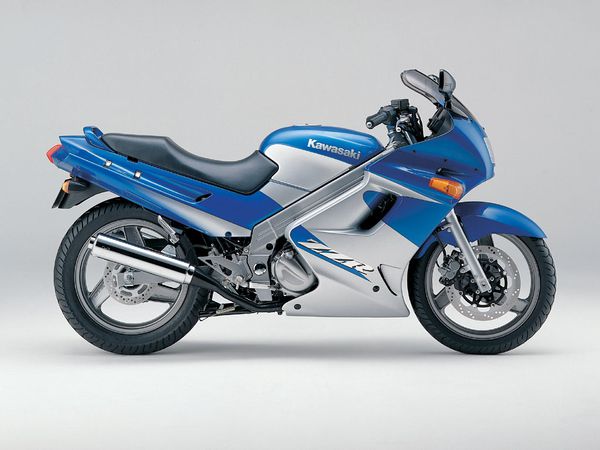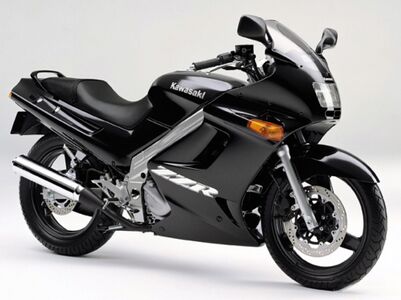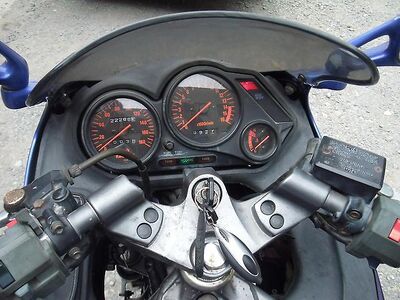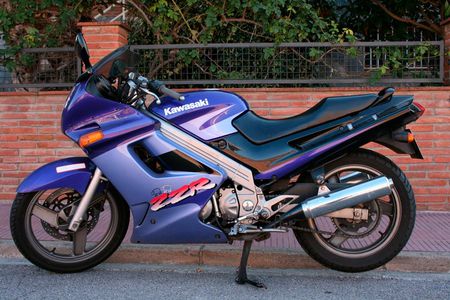Difference between revisions of "Kawasaki ZZR250"
m |
m |
||
| (4 intermediate revisions by the same user not shown) | |||
| Line 1: | Line 1: | ||
{{DISPLAYTITLE: Kawasaki ZZR 250 (EX250H)}} | {{DISPLAYTITLE: Kawasaki ZZR 250 (EX250H)}} | ||
| + | {{#seo: | ||
| + | |keywords={{PAGENAME}}, review, specs, owners manual, service manual, guide | ||
| + | |og:image=https://en.enduro.team/images/a/ab/Zzr250-1024.jpg | ||
| + | }} | ||
__notoc__ | __notoc__ | ||
| − | [[file: Zzr250 | + | [[file: Zzr250-1024.jpg | 600px | center | Kawasaki ZZR250 (EX250-H)]] |
| − | + | ''' Kawasaki ZZR 250 ''' sports touring model appeared in 1990 as the successor to the GPZ / GPX 250R models and was available in the markets of Japan, Europe and North America. | |
{{Ads_top}} | {{Ads_top}} | ||
| − | + | ||
| + | ''' Lineup: ''' | ||
| + | * [[Kawasaki_ZZR250 | Kawasaki ZZR250]] | ||
| + | * [[Kawasaki_ZZR400 | Kawasaki ZZR400]] | ||
| + | * [[Kawasaki_ZZR600 | Kawasaki ZZR600]] | ||
| + | * [[Kawasaki_ZZR1100 | Kawasaki ZZR1100]] | ||
| + | * [[Kawasaki_ZZR1200 | Kawasaki ZZR1200]] | ||
| + | * [[Kawasaki_ZZR1400 | Kawasaki ZZR1400]] | ||
| + | |||
| + | ''' Main competitors: ''' | ||
| + | * [[Suzuki_GSX250F_Across | Suzuki GSX 250 F Across]] | ||
| + | |||
| + | '''ZZR250''' was based on an in-line 2-cylinder liquid-cooled engine with a volume of 248 cc, producing up to 40 hp. power and up to 23 Nm of torque. The maximum characteristics of the motor are at 9500-12500 rpm. | ||
Kawasaki was one of the first (of the entire Japanese "four" motorcycle manufacturers) to use simpler and more reliable 2-cylinder engines on small-cubic models. If you recall, the approach of the Japanese companies to the creation of 250 cc sports / sports-touring motorcycles was quite simple: they took a 400 cc version, which reduced engine displacement and slightly simplified the chassis equipment. The result was a model that was as similar to track motorcycles as possible, with a capacity of up to 45 hp. Motorcycles turned out to be quite expensive, but at the same time they had a very small engine resource (due to its huge boost, small volume and a large number of cylinders). Kawasaki tried to get away from this concept by releasing the Kawasaki ZZR 250 model, which turned out to be so successful, reliable and in demand in the market that it was produced practically unchanged until mid-2007, until new environmental requirements came out that the motorcycle could no longer meet. | Kawasaki was one of the first (of the entire Japanese "four" motorcycle manufacturers) to use simpler and more reliable 2-cylinder engines on small-cubic models. If you recall, the approach of the Japanese companies to the creation of 250 cc sports / sports-touring motorcycles was quite simple: they took a 400 cc version, which reduced engine displacement and slightly simplified the chassis equipment. The result was a model that was as similar to track motorcycles as possible, with a capacity of up to 45 hp. Motorcycles turned out to be quite expensive, but at the same time they had a very small engine resource (due to its huge boost, small volume and a large number of cylinders). Kawasaki tried to get away from this concept by releasing the Kawasaki ZZR 250 model, which turned out to be so successful, reliable and in demand in the market that it was produced practically unchanged until mid-2007, until new environmental requirements came out that the motorcycle could no longer meet. | ||
| − | + | Kawasaki ZZR 250 features an aluminum frame, simple suspensions in the form of a conventional telescopic fork and a progressive monoshock, disc brakes, an 18 l fuel tank (17 l - since 2000), a 6-speed gearbox and only 146 kg of dry weight. | |
At the end of August 2007, the model is officially discontinued. In 2008, a new model was introduced as the successor to the Kawasaki ZZR250 - [[Kawasaki_Ninja_250R | Kawasaki Ninja 250R]]. | At the end of August 2007, the model is officially discontinued. In 2008, a new model was introduced as the successor to the Kawasaki ZZR250 - [[Kawasaki_Ninja_250R | Kawasaki Ninja 250R]]. | ||
| − | |||
| − | |||
| − | |||
== Photos == | == Photos == | ||
| − | + | <gallery mode="packed" heights=200px> | |
| − | + | File:KAWASAKIZZR-250-1563_3.jpg| | |
| − | + | File:1343807519359 bulletin.jpg| | |
| − | + | File:Kawasaki-zzr-250-2003-moto.jpeg| | |
| − | + | </gallery> | |
| − | |||
{{Ads_feed}} | {{Ads_feed}} | ||
{{Ads_post}} | {{Ads_post}} | ||
Latest revision as of 15:24, 20 July 2023
Kawasaki ZZR 250 sports touring model appeared in 1990 as the successor to the GPZ / GPX 250R models and was available in the markets of Japan, Europe and North America.
Lineup:
Main competitors:
ZZR250 was based on an in-line 2-cylinder liquid-cooled engine with a volume of 248 cc, producing up to 40 hp. power and up to 23 Nm of torque. The maximum characteristics of the motor are at 9500-12500 rpm.
Kawasaki was one of the first (of the entire Japanese "four" motorcycle manufacturers) to use simpler and more reliable 2-cylinder engines on small-cubic models. If you recall, the approach of the Japanese companies to the creation of 250 cc sports / sports-touring motorcycles was quite simple: they took a 400 cc version, which reduced engine displacement and slightly simplified the chassis equipment. The result was a model that was as similar to track motorcycles as possible, with a capacity of up to 45 hp. Motorcycles turned out to be quite expensive, but at the same time they had a very small engine resource (due to its huge boost, small volume and a large number of cylinders). Kawasaki tried to get away from this concept by releasing the Kawasaki ZZR 250 model, which turned out to be so successful, reliable and in demand in the market that it was produced practically unchanged until mid-2007, until new environmental requirements came out that the motorcycle could no longer meet.
Kawasaki ZZR 250 features an aluminum frame, simple suspensions in the form of a conventional telescopic fork and a progressive monoshock, disc brakes, an 18 l fuel tank (17 l - since 2000), a 6-speed gearbox and only 146 kg of dry weight.
At the end of August 2007, the model is officially discontinued. In 2008, a new model was introduced as the successor to the Kawasaki ZZR250 - Kawasaki Ninja 250R.
Photos
Specifications
Specifications Kawasaki ZZR250:
| Model | Kawasaki ZZR250 |
|---|---|
| Motorcycle type | sports tourist |
| Release year | 1990-2007 |
| Frame | aluminum diagonal |
| Engine type | 2-cylinder, 4-stroke, in-line |
| Working volume | 248 cm³ |
| Bore / Stroke | 62.0 x 41.2 mm |
| Compression ratio | 12.4: 1 |
| Cooling | liquid |
| Number of valves per cylinder | DOHC, 4 valves per cylinder |
| Fuel supply system | Carburetor, 2x Keihin CVK30 |
| Ignition type | transistor |
| Maximum power | 40.0 h.p. (29.4 kW) @ 12,500 rpm - EX250-H1-H10 (Japanese versions)
36.0 h.p. (26.5 kW) @ 12,000 rpm - EX250-H11-H7F (Japanese versions), full-strength European versions |
| Maximum torque | 23.0 Nm (2.4 kg * m) @ 10,000 rpm - EX250-H1-H10 (Japanese versions)
21.6 Nm (2.2 kg * m) @ 9500 rpm - EX250-H11-H7F (Japanese versions), full European versions |
| Gearbox | 6-speed |
| Drive type | chain |
| Front tire size | 100 / 80-17 52S (52H) |
| Rear tire size | 140 / 70-17 66S (66H) |
| Front brakes | 1 disc, 300 mm, 2-piston caliper |
| Rear brakes | 1 disc, 220 mm, 1-piston caliper |
| Front suspension | 37mm telescopic fork, 125mm travel |
| Rear suspension | linkage Uni-Trak with monoshock, stroke - 110 mm |
| Motorcycle length | 2050 mm |
| Motorcycle width | 700 mm |
| Motorcycle height | 1125 mm |
| Wheelbase | 1405 mm |
| Saddle height | 760 mm |
| Minimum ground clearance | 135 mm |
| Acceleration to 100 km / h | 6.0 sec. |
| Maximum speed | 160 km / h |
| Fuel tank capacity | 18.0 L - EX250-H1-H10
17.0 L - EX250-H11-H7F |
| Motorcycle weight (dry) | 146 kg - EX250-H1-H10
148 kg - EX250-H11-H7F |
Fuel consumption
The officially declared fuel consumption for the Kawasaki ZZR 250 ranges from 3.17 liters to 4.90 liters per 100 kilometers. The exact value depends on the riding style and the condition of the motorcycle.
Documentation



